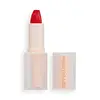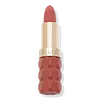What's inside
What's inside
 Key Ingredients
Key Ingredients

 Benefits
Benefits

 Concerns
Concerns

 Ingredients Side-by-side
Ingredients Side-by-side

Phenyl Trimethicone
Skin ConditioningDimethicone
EmollientParaffin
PerfumingCaprylic/Capric Triglyceride
MaskingIsononyl Isononanoate
EmollientSilica
AbrasiveHydrogenated Polyisobutene
EmollientDiisostearyl Malate
EmollientOctyldodecanol
EmollientDimethicone/Vinyl Dimethicone Crosspolymer
Skin ConditioningOzokerite
Emulsion StabilisingVinyl Dimethicone/Methicone Silsesquioxane Crosspolymer
Euphorbia Cerifera Cera
AstringentCera Microcristallina
Emulsion StabilisingSimmondsia Chinensis Seed Oil
EmollientPhenoxyethanol
PreservativeCaprylyl Glycol
EmollientTocopheryl Acetate
AntioxidantAscorbyl Tetraisopalmitate
AntioxidantEthylhexylglycerin
Skin ConditioningLimnanthes Alba Seed Oil
Skin ConditioningGlyceryl Behenate
EmollientSodium Hyaluronate
HumectantCI 77891
Cosmetic ColorantCI 77491
Cosmetic ColorantCI 15850
Cosmetic ColorantPhenyl Trimethicone, Dimethicone, Paraffin, Caprylic/Capric Triglyceride, Isononyl Isononanoate, Silica, Hydrogenated Polyisobutene, Diisostearyl Malate, Octyldodecanol, Dimethicone/Vinyl Dimethicone Crosspolymer, Ozokerite, Vinyl Dimethicone/Methicone Silsesquioxane Crosspolymer, Euphorbia Cerifera Cera, Cera Microcristallina, Simmondsia Chinensis Seed Oil, Phenoxyethanol, Caprylyl Glycol, Tocopheryl Acetate, Ascorbyl Tetraisopalmitate, Ethylhexylglycerin, Limnanthes Alba Seed Oil, Glyceryl Behenate, Sodium Hyaluronate, CI 77891, CI 77491, CI 15850
Dimethicone
EmollientCaprylic/Capric Triglyceride
MaskingPolyethylene
AbrasiveOctyldodecanol
EmollientAluminum Hydroxide
EmollientPolysilicone-11
Hydrated Silica
AbrasivePolyhydroxystearic Acid
EmulsifyingSynthetic Wax
AbrasiveDisteardimonium Hectorite
StabilisingSynthetic Beeswax
Emulsion StabilisingDicalcium Phosphate
AbrasiveParfum
MaskingCopernicia Cerifera Wax
Triethoxycaprylylsilane
Pentaerythrityl Tetra-Di-T-Butyl Hydroxyhydrocinnamate
AntioxidantRicinus Communis Seed Oil
MaskingSodium Hyaluronate
HumectantHydrogenated Castor Oil
EmollientCI 77891
Cosmetic ColorantCI 77491
Cosmetic ColorantCI 15850
Cosmetic ColorantCI 19140
Cosmetic ColorantCI 42090
Cosmetic ColorantDimethicone, Caprylic/Capric Triglyceride, Polyethylene, Octyldodecanol, Aluminum Hydroxide, Polysilicone-11, Hydrated Silica, Polyhydroxystearic Acid, Synthetic Wax, Disteardimonium Hectorite, Synthetic Beeswax, Dicalcium Phosphate, Parfum, Copernicia Cerifera Wax, Triethoxycaprylylsilane, Pentaerythrityl Tetra-Di-T-Butyl Hydroxyhydrocinnamate, Ricinus Communis Seed Oil, Sodium Hyaluronate, Hydrogenated Castor Oil, CI 77891, CI 77491, CI 15850, CI 19140, CI 42090
 Reviews
Reviews

Ingredients Explained
These ingredients are found in both products.
Ingredients higher up in an ingredient list are typically present in a larger amount.
This ingredient is an emollient, solvent, and texture enhancer. It is considered a skin-softener by helping the skin prevent moisture loss.
It helps thicken a product's formula and makes it easier to spread by dissolving clumping compounds.
Caprylic Triglyceride is made by combining glycerin with coconut oil, forming a clear liquid.
While there is an assumption Caprylic Triglyceride can clog pores due to it being derived from coconut oil, there is no research supporting this.
Learn more about Caprylic/Capric TriglycerideCi 15850 is the pigment color red. It is an azo dye and created synthetically.
Azo dyes need to be thoroughly purified before use. This allows them to be more stable and longer-lasting.
This ingredient is common in foundations, lipsticks, and blushes. This color is described as brown/orangey red.
It has many secondary names such as Red 6 and Red 7. According to a manufacturer, Red 6 usually contains aluminum.
Learn more about CI 15850Ci 77491 is also hydrated iron III oxide. It's sole purpose is to give a red/pink hue to products.
Iron III oxides are classified as inorganic chemicals for coloring.
Synthetically created Ci 77491 is considered safer than those naturally found. This is because the synthetically created version may contain less impurities. Iron oxides are generally non-toxic and non-allergenic.
Learn more about CI 77491Ci 77891 is a white pigment from Titanium dioxide. It is naturally found in minerals such as rutile and ilmenite.
It's main function is to add a white color to cosmetics. It can also be mixed with other colors to create different shades.
Ci 77891 is commonly found in sunscreens due to its ability to block UV rays.
Learn more about CI 77891Dimethicone is a type of synthetic silicone created from natural materials such as quartz.
What it does:
Dimethicone comes in different viscosities:
Depending on the viscosity, dimethicone has different properties.
Ingredients lists don't always show which type is used, so we recommend reaching out to the brand if you have questions about the viscosity.
This ingredient is unlikely to cause irritation because it does not get absorbed into skin. However, people with silicone allergies should be careful about using this ingredient.
Note: Dimethicone may contribute to pilling. This is because it is not oil or water soluble, so pilling may occur when layered with products. When mixed with heavy oils in a formula, the outcome is also quite greasy.
Learn more about DimethiconeOctyldodecanol is a fatty alcohol. It is primarily used to enhance the texture of products.
As an emulsifier, Octyldodecanol helps prevent the oils and waters from separating. It also prevents ingredients from creating foam when shaken.
Octyldodecanol is created by reducing fatty acid to an alcohol.
Due to its high molecular weight, it does not get absorbed into the skin.
Learn more about OctyldodecanolSodium Hyaluronate is hyaluronic acid's salt form. It is commonly derived from the sodium salt of hyaluronic acid.
Like hyaluronic acid, it is great at holding water and acts as a humectant. This makes it a great skin hydrating ingredient.
Sodium Hyaluronate is naturally occurring in our bodies and is mostly found in eye fluid and joints.
These are some other common types of Hyaluronic Acid:
Learn more about Sodium Hyaluronate